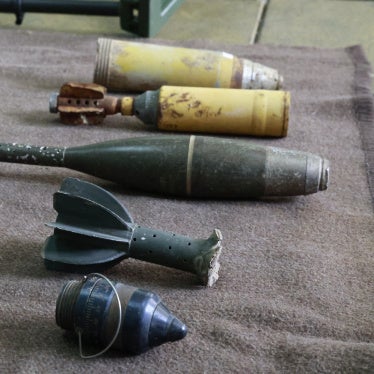(New York) -- The United States should not use antipersonnel landmines in Afghanistan and should take extra care not to drop food into areas that have been mined by others, Human Rights Watch urged today.
In a new backgrounder released today, Human Rights Watch said that only two of Afghanistan's twenty-nine provinces are believed to be free of mines and unexploded ordnance (UXO). The most heavily affected provinces are Herat and Kandahar, the latter being the Taliban's chief stronghold. The provinces bordering on Pakistan and Iran, which are the most common destinations for refugees fleeing the country, are also heavily mined; they include Farah, Paktia, Kabul, Zabul, Ghazni, and Paktika. Even the capital, Kabul, is mine-affected.
"Afghanistan is already one of the most heavily mined countries in the world, and the United States should not be making it worse," said Joost Hiltermann, executive director of the Arms division of Human Rights Watch. "Landmines are indiscriminate weapons that will still kill civilians even if the Taliban is ousted."
Landmines may already kill or maim more civilians in Afghanistan than in any other country. In the year 2000, there were on average about eighty-eight recorded mine/UXO casualties per month. It is believed that the actual number of mine victims could be 50 percent to 100 percent greater, taking into account those deaths and injuries that go unreported. And the toll is likely to grow significantly with the rapid and chaotic movement into unfamiliar territory of civilians who fear U.S. airstrikes and military operations by the various Afghan forces.
Human Rights Watch has not been able to verify whether U.S. food drops have in fact landed in mined areas. But since Afghanistan has been heavily mined by various parties over two decades of war, the United States should take extra precautions to avoid mined areas.
While virtually all combatants in Afghanistan in recent decades are thought to have used mines, most were laid by Soviet and pro-Soviet Afghan government forces from 1979-1992. The Taliban claims to have stopped the use of antipersonnel mines in 1998, declaring it un-Islamic and punishable by death. There has been no credible evidence of use by Taliban forces since 1998, though some allegations have emerged in recent weeks. The opposition United Front are believed to be continuing their use of antipersonnel mines. "Even if no new landmines are laid, efforts to demine the country will undoubtedly be scaled back for the duration of the armed conflict," said Hiltermann. "The grim reality is that the mine situation in Afghanistan can only be exacerbated by the current crisis."
A total of 142 countries have joined the 1997 Mine Ban Treaty, which prohibits the use production, stockpiling, and transfer of antipersonnel landmines under any circumstance and requires destruction of stockpiled and emplaced mines. On Tuesday, Algeria became the latest country to ratify the treaty, which has been ratified more quickly than any multilateral treaty in history. The United States has not joined.
As a founding member of the International Campaign to Ban Landmines (ICBL), Human Rights Watch is a staunch supporter of the call for a total ban on the use, production, stockpiling, and transfer of antipersonnel landmines. It serves as Coordinator of the ICBL's civil-society based verification initiative, the Landmine Monitor.







